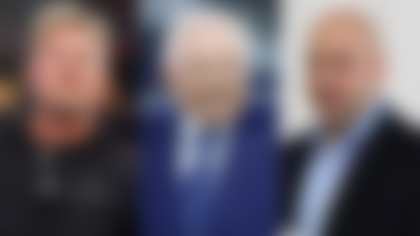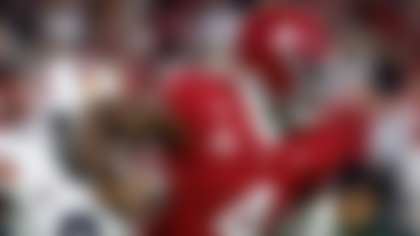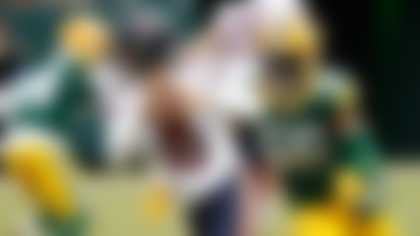Near the conclusion of the negotiations that ended the NFL's lockout nearly three years ago, New York Giants president John Mara and Dallas Cowboys owner Jerry Jones were walking to the league's lawyers' office when Mara slipped into a Starbucks to get coffee. Jones decided to wait for Mara outside, and when Mara emerged a few minutes later, Jones told him: "Am I glad to see you. I don't know how many more '(Expletive) the Cowboys' I could hear."
Jones was laughing that day, at once disarmed by and delighted with his team's -- and his own -- notoriety. On Tuesday, the 25th anniversary of his purchase of the Cowboys, there can be little question that Jones is the NFL's most recognizable owner. He is renowned among his peers and reporters for his monologues -- he once told Mara in a negotiating session not to let him talk too much, only to cut Mara off after two sentences to offer a 15-minute disquisition, to the amusement of other players and owners. He's also well known for his appearance in rap videos, his sometimes-anguished visage, surrounded by family and friends in his lavish box, at the end of Cowboys games, and his impolitic but endearing announcements, like the time he vowed at a training camp rally to "beat the New York Giants' ass."
But Jones' celebrity stems from an influence over the NFL that is even more outsized than the massive recreational vehicle the Cowboys park on an Indianapolis street to use as their headquarters during the annual NFL Scouting Combine, or the dynasty he created when the Cowboys won three Super Bowls in the mid-1990s.
For as much controversy as Jones' stewardship of the Cowboys has generated of late -- he is his own general manager, and he is surely the only owner who regularly conducts postgame news conferences, all for a team that has won just two playoff games since its last championship -- his imprint is as hard to miss as the behemoth of a stadium in which his squad plays. He bought the Cowboys for $140 million -- a fire-sale price, in retrospect -- and, almost as quickly as he changed coaches, he began to change the league.
Less than six months after Jones' purchase of the team, he was one of a cadre of newer owners who resisted an effort led by league insiders to have Jim Finks replace Pete Rozelle as commissioner. The Chicago 11, as the group came to be known because of the site of the vote, held up approval of Finks, and several months later, Paul Tagliabue became the commissioner. Just a few months after that, Jones was an instrumental member of a small group of owners who refused to agree to give television networks -- which were, at the time, losing millions on broadcasting NFL games -- a rebate.
"It would be shortsighted on our part to do that," Jones said in early 1993.
He was right. The networks expected the rights fees to drop with the next contracts. Instead, Jones -- by then a member of the broadcasting committee -- engaged Fox's Rupert Murdoch, and Fox snatched the broadcasting rights away from CBS in a contract that topped $1 billion, launching the era of mega-broadcast deals and the NFL's stranglehold on television ratings. Later still, Jones carved out an agreement with the NFL, after the NFL sued him, that allowed the Cowboys to sign licensing deals with sponsors that competed with league-wide sponsors. Even the new collective bargaining agreement allows the Cowboys to be the only team that markets its own apparel.
Many of his fellow owners in the tradition-bound NFL viewed Jones as too much of a risk-taker. But in 2012, Forbes placed the value of the Cowboys at $2.1 billion, making them, at the time, the second-most valuable sports franchise in existence, behind only Manchester United.
That figure is a testament to Jones' business acumen and his vision. He recognized the importance of building his brand earlier than almost anybody else and misses no opportunity to remind everyone that his is America's Team. But Jones' financial success and his influence in steering the league are especially noteworthy because it has all come at a time when his team's on-field fortunes have waned.
After firing coach Jimmy Johnson, Jones won another Super Bowl with Barry Switzer during the 1995 season -- but Dallas has not made it back to the big game since. Jones is regularly scorched for the failures of his team, and needled by those who believe he wants to coach, too. He has run through a breathtaking array of coaches -- from Dave Campo to Bill Parcells, settling for now on Jason Garrett -- but the Cowboys have been stuck in neutral, finishing 8-8 the past three seasons and, perhaps most galling to Jones, watching the Giants win two Super Bowls since 2007.
Jones told The Dallas Morning News, in a story commemorating his purchase of the team, that he wonders how in the world the Cowboys have not been to more Super Bowls.
"As I sit here after 25 years, the thing that bothers me most is that after the excellent blast-off, the excellent start, we haven't gotten another Super Bowl," Jones told the newspaper. "More than one.
"That's where we get, and should receive, criticism."
It might be the only tarnish on Jones' silver anniversary.
Follow Judy Battista on Twitter @judybattista.













